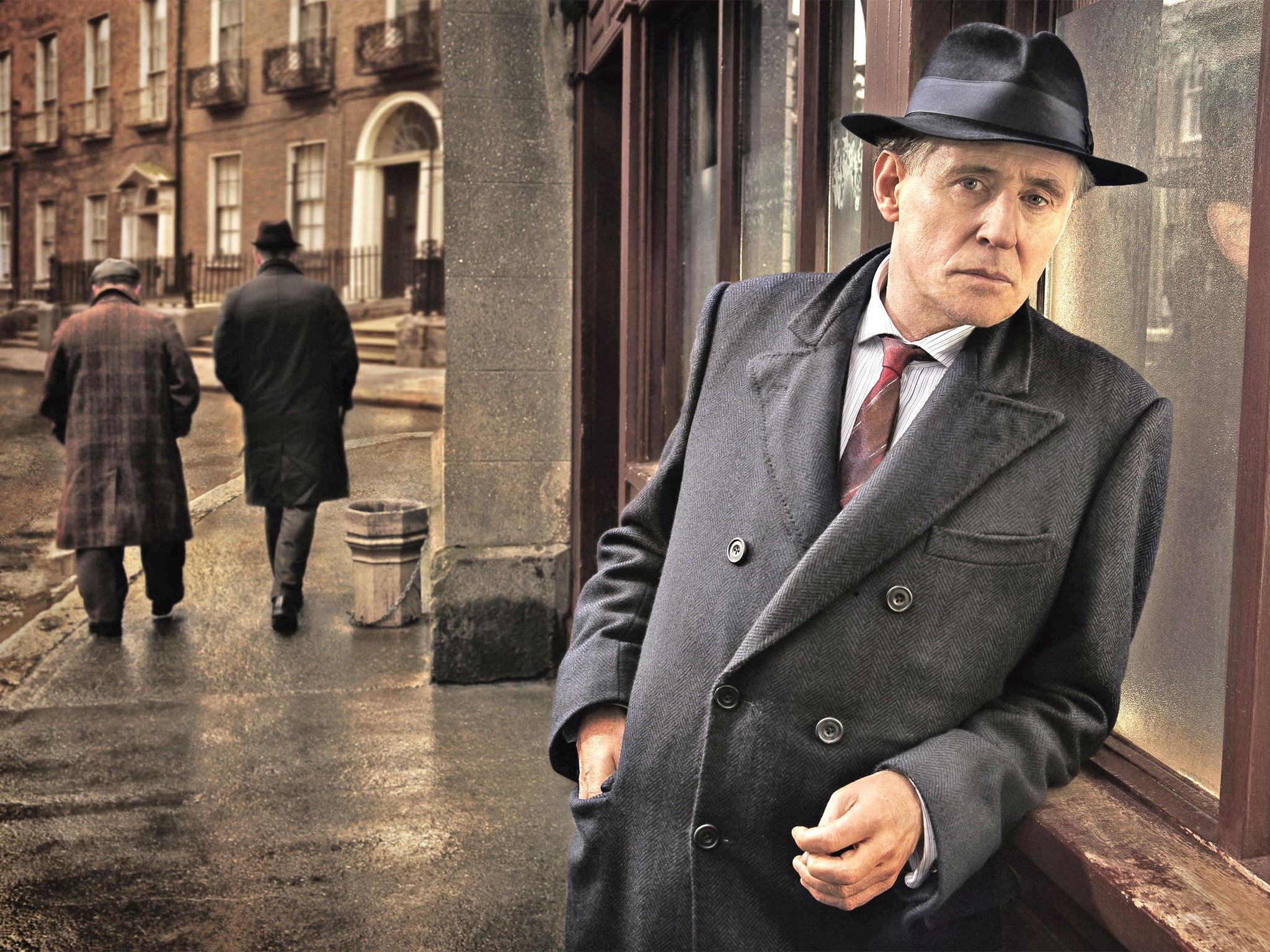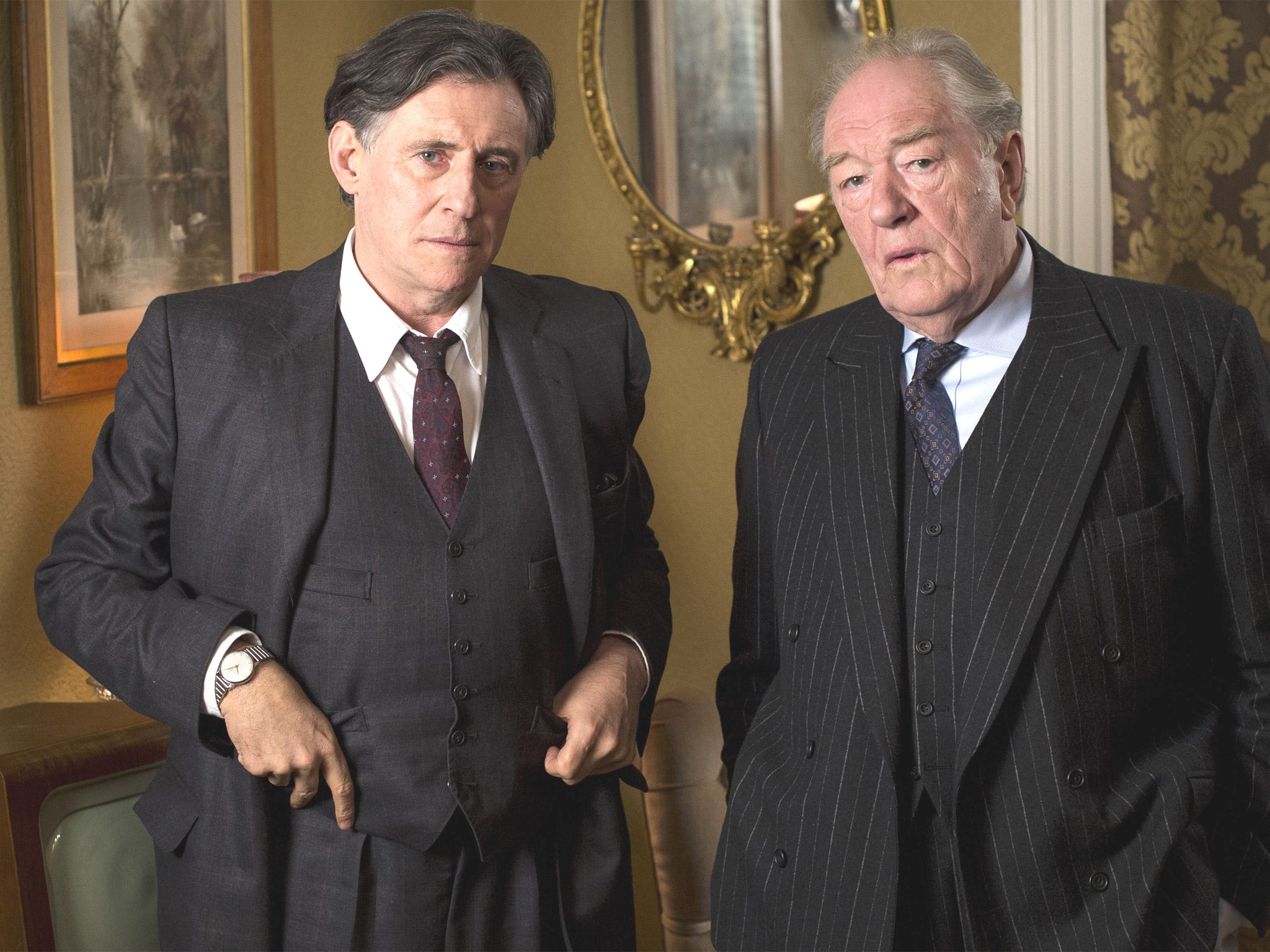Dublin-born Gabriel Byrne returns to the city to star in BBC1's Fifties-set crime noir Quirke
The show is the creation of Byrne's compatriot Benjamin Black – aka Booker Prize winner John Banville. They tell Gerard Gilbert why Ireland still stirs up painful memories

When last year native Dubliner but long-term resident of New York (and before that Los Angeles), Gabriel Byrne found himself filming back in the Irish capital, the city of his not altogether happy childhood, it was experience he describes as "crashing into my past". "By absolute coincidence, we were shooting in the very first apartment I ever had… on Pembroke Road," says the star of Miller's Crossing, The Usual Suspects and HBO's In Treatment. "And we shot in the theatre where I made my first professional appearance (the Olympia Theatre)… Phow… déjà vu doesn't begin to describe it."
What made the experience doubly powerful for Byrne is that the BBC drama he was filming, 'Quirke', is set in mid-1950s Dublin, the decade of Byrne's boyhood – growing up the son of a cooper's labourer making wooden barrels for Guinness. Quirke (we don't discover his first name) is the pathologist hero – or anti-hero – of a series six crime novels written by the Booker Prize winning novelist John Banville under the pseudonym of Benjamin Black.
"When he started to write in his nom de plume Benjamin Black I was very curious to see how he would approach the detective genre," says Byrne. "And of course being Banville, he does have the mystery there for sure, but what makes the books and the programme interesting is that it's as much a study of character."
Banville turned to crime fiction in 2005, the same year that he won the Booker Prize for The Sea, although Quirke's origins lie in a TV mini-series commissioned (but never filmed) by RTE in Ireland and ABC in Australia, called Christine Falls and telling of the scandal of the Irish orphans shipped off by the Catholic Church to Australia and America during the 1950s. In the meantime, having read for the first time the prolific Belgian crime writer Georges Simenon, and been duly impressed, Banville decided to turn Christine Falls into a crime novel.
"I went to stay with a friend in Italy," he says. "I sat down in my room at nine o'clock on a Monday morning in cold March in Tuscany and began to write Christine Falls. I didn't know whether I could do it or not but by lunchtime I had written two and a half thousand words. Normally I'd be lucky to write 200 words in a day."
Banville is keen to quash the idea that such a rapid word-rate means he somehow considers crime fiction easier – and therefore somehow more facile – to his literary oeuvre. "This is a canard that's been going ages," he says. "It arose because I said at some crime writers' festival that I wrote very quickly as Black and very slowly as Banville, annoying the real crime writers… I don't know why. Simenon used to write his books in 10 minutes, and what greater a master could you have?
"I write Benjamin Black very quickly because I write spontaneously. Benjamin Black is a tightrope walker and he mustn't look down… just keep on going. Poor Banville is a mole digging away in the dark, year after year, hoping eventually to come up into the light."

Byrne and Banville first met in 1984 when the actor starred in a Channel 4 film, Reflections, based on the author's novel The Newton Letter. And yet Byrne had practical reservations about playing Banville's creation. "I joke with John about this, but Quirke was originally six-feet -four, had the feet of a dancer and blond hair," says Byrne. "And John said, 'It's a curious thing… since you started to do this, I've started to darken Quirke's hair and make him a little smaller.'" Banville himself adds: "Quirke started being enormously tall and blond and handsome and irresistible as a joke on myself because he's the exact opposite physically from me. Gabriel's a great catch for the role… I think he carries a sort of unshiftable melancholy."
To research his character, Byrne shadowed some real Dublin pathologists. "We talked about the soul, and how you differentiate between the brain and the soul," he says. "And I asked one guy 'are all dead bodies the same?' And he said, 'No, they're not… sometimes you'll get a person in who had been unexpectedly killed or murdered or died in a car crash – and the energy is trapped in their body, and it takes a while for that energy to leave.' So I said, 'What do think about that?' And he said, 'On a practical note, never ever leave anybody angry… anger gets trapped in the body."

Watch Apple TV+ free for 7 day
New subscribers only. £9.99/mo. after free trial. Plan auto-renews until cancelled.
ADVERTISEMENT. If you sign up to this service we will earn commission. This revenue helps to fund journalism across The Independent.

Watch Apple TV+ free for 7 day
New subscribers only. £9.99/mo. after free trial. Plan auto-renews until cancelled.
ADVERTISEMENT. If you sign up to this service we will earn commission. This revenue helps to fund journalism across The Independent.
Co-starring Michael Gambon as Quirke's adoptive father, a Dublin judge, the first of three sympathetically understated adaptations (by Andrew Davies) is the aforementioned Christine Falls, in which a nefarious Catholic brotherhood sells orphaned babies to America – a similar theme, as it happens, to Steve Coogan's Oscar-nominated film Philomena.
"It was a form of legalised kidnapping… a horrible thing to do to the child, and to the mother and father," says Byrne, who has more reason for most for hating the Church, having been sexually abused by priests between the ages of eight and 11. "Ireland in the Fifties was almost a Talibanesque society… a terribly oppressed society. Now all the rocks have been lifted up and all the maggots have crawled out."
"The Catholic Church was our communist party," concurs Banville, who was brought up in the market town of Wexford. "They ran every single aspect of our lives… we didn't know it at the time, we thought we were free. I think that's the fundamental theme of these books – the un-freedom of these people."
The author didn't have a hand in the TV series. "Apart from anything else, filming is so boring," he says. "When my daughter started doing dressage horse riding I went to watch one day – all this preparation and she'd canter six paces and that was it… over. And suddenly I thought, 'I know what this is like… it's like making movies'."
'Quirke' begins on Sunday at 9pm on BBC1
Join our commenting forum
Join thought-provoking conversations, follow other Independent readers and see their replies
Comments